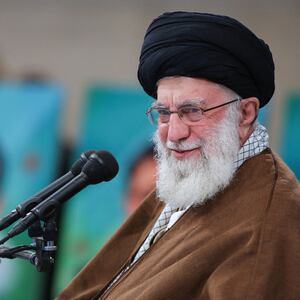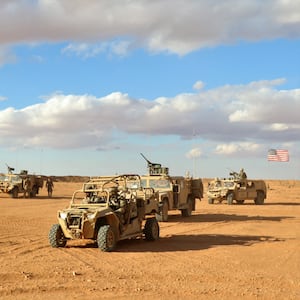The United States has been hitting back at Iran-linked militants after a barrage of attacks on American targets in the Middle East in recent weeks, with U.S. forces conducting several retaliatory strikes that run the risk of kicking off a wider war.
Although the U.S. says the operations are aimed at deterring further attacks against its forces in the region, the retaliatory strikes haven’t been entirely successful. Just on Friday, U.S. military bases bore the brunt of three attacks in both Iraq and Syria, according to a report from the AP.
The ongoing clashes have raised concerns that the U.S. may inadvertently set off a wider escalation, as opposed to the intended goal of deterring attacks on American forces in the region. While the U.S. has been able to counterattack without a massive escalatory response from Iran so far, the back-and-forth—and ongoing attacks against U.S. forces in the region—paves the way for possible accidents and misinterpretation.
That’s according to Brian Finucane, who previously worked in the Office of the Legal Adviser at the State Department, where he advised on the legal and policy issues relating to counterterrorism and the use of military force.
“There's plenty of room for miscalculation or mishap on both sides,” Finucane, now a Senior Adviser for the U.S. Program of the International Crisis Group, told The Daily Beast. “If U.S. service members were God forbid killed in an attack, the U.S. may feel it has to ratchet up its response further, potentially to include directly targeting IRGC personnel, which the administration has not done thus far.”
One of the stated goals of the Biden administration’s attacks on Iran-linked targets is to prevent spillover of Israel’s war against Hamas in Gaza. “The president has no higher priority than the safety of U.S. personnel, and he directed today's action to make clear that the United States will defend itself, its personnel, and its interests," Defense Secretary Lloyd Austin said in a statement on Sunday.”
U.S. officials have been warning Iran and its proxies for weeks to stay out of Israel’s war against Hamas in Gaza. Nevertheless, Iranian-linked forces have launched a slew of attacks against U.S. forces in Syria and Iraq almost daily since mid-October.
A U.S. warship had to take out several missiles and drones that Iran-backed Houthis launched from Yemen last month. On Tuesday, Iran-backed Houthis said it had fired ballistic missiles on Israeli targets.

Houthi fighters gather during a military maneuver near Sanaa, Yemen, Oct. 30, 2023.
Houthi Media Center/ReutersIn Finucane’s view, neither the United States nor Iran are likely seeking wider war. Iran is currently juggling an attempt to assert itself against the United States’ support for Israel with an attempt to not trigger a wider war—no easy feat of a task, said Finucane.
“Iran is walking a fine line here where they, on the one hand, want to maintain pressure on the U.S., including in response to U.S. support for Israel in Gaza, but they don't want a regional war themselves,” Finucane said.
The Pentagon has been working to spin a narrative that the U.S. counterstrikes against Iranian targets in recent days is an indication that U.S. deterrence is working. That’s in part because the Department of Defense claims that the counterstrikes have helped prevent the Israel-Hamas war from spilling over into the region, Pentagon Deputy Press Secretary Sabrina Singh told reporters Tuesday.
“This war we want to see is contained to Israel and within Gaza. We do not want to see a wider regional conflict,” Singh said. “As of today, that has not happened. We have not seen this war spillover into other neighboring countries and into the region.”
But that’s in the eye of the beholder, said Finucane. As of late March, Iran and its proxy forces had attacked U.S. forces 83 times since President Joe Biden took office, according to Task and Purpose. Iran-linked attacks on U.S. forces since just October 7 have tallied to approximately 60.
An argument can be made that Iran’s attacks on U.S. forces in the region represent a spillover of the Israel-Hamas war, according to Finucane’s count.
“There has been a spillover of this war. There was a lull of these attacks on U.S. forces in Iraq and Syria, and that lull stopped, it ended… in the midst of this conflict,” Finucane said. “The conflict has spilled over.”
In response to questions about why the Department of Defense views its counterstrikes as successful given the attacks against U.S. forces continue, the Pentagon insisted Tuesday that the continued attacks against U.S. troops are a “separate issue” from deterring Iran.

Part of a US military convoy sent as a reinforcement to the bases controlled by the PKK/YPG in Deir ez-Zor province in Syria, on Aug. 13, 2023.
Omer Al Diri/Anadolu Agency via Getty ImagesBut even if that were true, U.S. officials have admitted that a goal of the counterstrikes is to respond to Iranian provocations—not just to prevent spillover.
Gen. Michael Kurilla, the head of U.S. Central Command, said that the attacks were a “response” to “continued provocations by Iran's Islamic Revolutionary Guard Corps and their affiliated groups in Iraq and Syria.”
Take a Hint
The United States has been making additional efforts to send its message to Iran, including by sending two carrier strike groups to the region and issuing numerous public statements to ward off Iranian aggression.
U.S. Secretary of State Tony Blinken traveled to Iraq last week to meet with Iraqi Prime Minister Mohammed Shia Al-Sudani to urge a crackdown on militias in the country and thwart any escalation, as well, according to Reuters.
To prevent things from spiraling, though, the United States would do well to be thinking through other steps beyond just a beefed up presence, diplomacy, and counter attacking that might help cooler heads prevail—such as quietly withdrawing troops from the region, said Finucane.
“The U.S. needs to be thinking of other tools to lower the temperature to reduce the risk of war intensified and wider regional conflict.”
But one major question remains, is Tehran explicitly ordering its proxies or Iran-backed militants to go after U.S. forces in the region? The level of control Iran has over the proxies in question is not entirely clear, but the Pentagon suggested that it believes that Iran has some level of influence over the groups.
“The IRGC, you know, supports, arms, equips, funds, trains these groups. So they do maintain some level of accountability over these groups,” Singh said. “The strikes that we are taking is to signal and to send a very strong signal to Iran and… their affiliated groups to stop… I think that Iran is certainly seeing that message.







